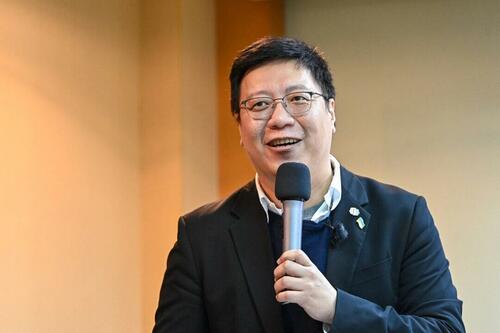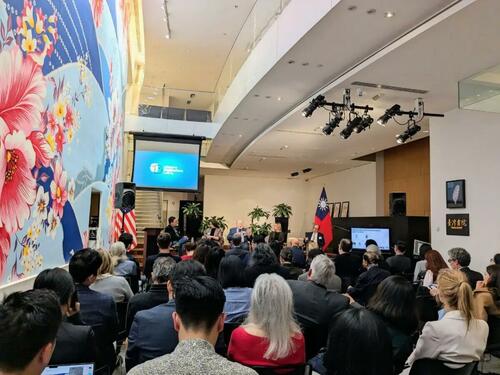World Unprepared For Fight Against Chinese Disinformation Around Elections, Warns Analyst
Authored by Eva Fu via The Epoch Times (emphasis ours),
The world at large isn’t prepared for the pervasive disinformation operations coming from adversaries such as China that aim at swinging votes, warned a research analyst.
If countries “calculate how much those people—[Russian President Vladimir] Putin, Xi Jinping—how much money and effort they are investing in those information operations, do the math, and then calculate how much money you’re putting into defense in a society,” the conclusion is “you are not prepared,” Wu Min-hsuan, CEO of Taiwan-based Doublethink Lab that focuses on digital defense, told The Epoch Times.
“Nobody’s prepared for that,” he said, describing the campaign as one of the Chinese regime’s “war tactics.”
Mr. Wu was one of the panelists at an event on Feb. 28 highlighting the threat of Chinese election meddling in a year when about half of the world’s population are set to cast a vote.
At the Taipei Economic and Cultural Office where the panel took place, Taipei’s ambassador, James K.J. Lee, said that Beijing has used Taiwan as a “test ground” for election interference in other democracies.
Ahead of Taiwan’s presidential election in January, China-linked malicious cyber attacks shot up more than two-fold, targeting government offices, police reports, and financial institutions, a U.S. cybersecurity firm found. Close to Election Day, Beijing-backed actors also spread fake news on social media to create the impression of food shortages to incite societal panic. A high volume of artificial intelligence-generated YouTube hosts also emerged on YouTube, making false claims in Mandarin and Cantonese about Taiwanese President Tsai Ing-wen’s personal life.
With its own elections drawing near, the United States should be on alert, the experts said.
Chinese state actors had tried to shape the outcome of certain races in the 2022 midterm elections, according to a December National Intelligence Council report. The same month, FBI Director Christopher Wray warned of “elevated” risk of outside election interference in the 2024 presidential elections. Microsoft analysts had also raised similar concerns in a report released in November.
Kenton Thibaut, senior fellow at the Atlantic Council’s Digital Forensic Research Lab, noted that the Chinese Communist Party considers its rivalry with the United States “an existential issue.”
“Based on past behavior, they‘ll be involved in this in some way,” Ms. Thibaut told The Epoch Times. “They’ve built out a lot of their digital infrastructure online across a number of social media platforms. I have every expectation that they’ll deploy those to put forward pro-China narratives, to exploit political tensions in the United States, and to try and paint the United States as hypocritical.”
It highlights part of the regime’s strategy—to win a “smokeless war” by “weakening the enemy from within,” she said.
AI represents a key new tool of Beijing’s disinformation warfare strategy to cover its tracks.
At the panel, Ms. Thibaut cited the Chinese regime’s efforts to shift the blame for the COVID-19 pandemic onto the United States by first generating a fake think tank report purporting to show the virus originating in Fort Detrick, a U.S. military base, then promoting the misinformation through its other channels.
In summer of 2022, a Chinese state-linked entity hired a Baltimore musician to stage a Black Lives Matter protest in front of the International Religious Freedom Summit and later, a mock protest against the U.S. ban on goods from Xinjiang. Both were recorded and circulated on social media to inflame domestic social tensions in the United States.
The regime’s bet is for pro-Beijing narratives to take on a life of their own, said Jacques deLisle, the Asia program chair at Foreign Policy Research Institute.
“Once the idea gets in and starts circulating, in democratic societies, it’s very hard to contain it—it is now a view held, for whatever good or bad reasons, by people who have a right in the system to have expressed opinions and vote on it,” he told The Epoch Times.
For the United States, the stakes are “very, very high” to mitigate any foreign election interference attempts, he said.
Even though effects of such efforts are hard to quantify, he said, “our elections are so close in this country now” that “even a modest impact—well under 1 percent in a few constituencies—can have significant outcomes.”
Tyler Durden
Mon, 03/04/2024 – 02:00
via ZeroHedge News https://ift.tt/TcsniDx Tyler Durden

